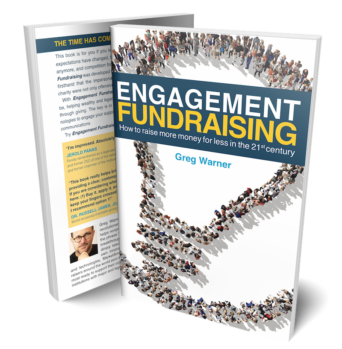We use cookies to ensure that we give you the best experience on our website. By continuing to use this site, you agree to our use of cookies in accordance with our Privacy Policy.
 Login
Login
Your Role
Challenges You Face
results
Learn
Resources
Company
Is Your CEO in Your Legacy Society?


 How about your board? Committee members?
How about your board? Committee members?
How about you?
Shouldn’t we be shooting for 100% participation among all of the above? How can you ask anyone to leave your organization in their estate plan if you haven’t done so already and neither has your board or CEO?
LIKE THIS BLOG POST? PLEASE SHARE IT AND/OR SUBSCRIBE
Get smarter with the SmartIdeas blog
Subscribe to our blog today and get actionable fundraising ideas delivered straight to your inbox!

GOOD INTENTION / WRONG APPROACH
Ok. Please give us the right approach.
Sorry readers … I hit the wrong button and sent the previous message prematurely. Now here’s the rest of why promoting 100% board participation in your organization’s legacy society is almost never a good idea, and why it may not make sense for a CEO or key development officer to be a legacy society member either.
Over the years I have heard occasional proponents of the idea that board / CEO / legacy staff / legacy giving committee should also be legacy society members. Only one is correct, members of the volunteer legacy giving committee, which I would suggest should be mandatory.
Board members should be solicited, but not those who are both new to the board and the organization. You would generally not make a one-on-one ask to any level donor who is new to your organization. Why would you treat a board member differently. I can’t convey strongly enough that it will be a major mistake for the legacy giving program to project a goal of 100% board participation. Such a position is not well thought through. What is appropriate for annual fundraising, is out of place in legacy giving.
First off, making a legacy gift is a highly personal decision. Some people don’t want to leave any estate gifts to charity. Others have a different favorite charity(ies) in mind, and yours may not make the cut off.
Second, some board members are recruited for an institutional connection. The Company risks putting these important members in an awkward situation for what is a corporate “seat.”
Third, implying to board members that they can make a small legacy gift to reach 100% participation both cheapens the gift, and is a slight to other board members who are genuinely making the commitment. It’s not too far akin from planned giving and other staff who make a legacy gift to their employer of a benefit, such as long-term health care, knowing that the gift evaporates when the employee leaves the organization. This is just the opposite of thoughtful.
Fourth, there may be board members whose association with the nonprofit is not yet long enough. It’s not respectful to them to force them to act through a long term plan with a short term relationship.
I do believe that most board members should be asked, probably all in an organization just starting a legacy program. For most organizations, achieving 50% legacy society participation would be great, perhaps higher is possible.
Now, more about the CEO / development officer legacy society member suggestion. In addition to many of the reasons above, add on to that that staff typically work in several organizations over a career. The worst version of making a legacy gift, and I’ve heard of this one several times unfortunately, is the staff person who uses a beneficiary designation of a benefit that disappears, along with the legacy gift, as soon as employment terminates. Think insurance, such as long term disability. Is this the kind of attitude we want staff to have when approaching our supporters to make a thoughtful decision on their own? I would suggest this approach cheapens legacy giving. It’s form over substance.
Now how do I really feel about this whole topic, you might ask?!
Wow, really great explanation Greg L.
Yes, Gary S, please do share with us how you really feel about this topic? 🙂 If a Development Officer (DO) has not herself made a bequest gift to the charity she is promoting to others (others who may think and feel the same way as the CEO and DO you describe in your explanation), then, how can the DO sincerely and honestly share the good work of the charity to prospects without feeling like a hypocrite?
[…] Yesterday I wrote a post titled, “Is CEO in your legacy society?” […]
GOOD INTENTION / WRONG APPROACH
Ok. Please give us the right approach.
Sorry readers … I hit the wrong button and sent the previous message prematurely. Now here’s the rest of why promoting 100% board participation in your organization’s legacy society is almost never a good idea, and why it may not make sense for a CEO or key development officer to be a legacy society member either.
Over the years I have heard occasional proponents of the idea that board / CEO / legacy staff / legacy giving committee should also be legacy society members. Only one is correct, members of the volunteer legacy giving committee, which I would suggest should be mandatory.
Board members should be solicited, but not those who are both new to the board and the organization. You would generally not make a one-on-one ask to any level donor who is new to your organization. Why would you treat a board member differently. I can’t convey strongly enough that it will be a major mistake for the legacy giving program to project a goal of 100% board participation. Such a position is not well thought through. What is appropriate for annual fundraising, is out of place in legacy giving.
First off, making a legacy gift is a highly personal decision. Some people don’t want to leave any estate gifts to charity. Others have a different favorite charity(ies) in mind, and yours may not make the cut off.
Second, some board members are recruited for an institutional connection. The Company risks putting these important members in an awkward situation for what is a corporate “seat.”
Third, implying to board members that they can make a small legacy gift to reach 100% participation both cheapens the gift, and is a slight to other board members who are genuinely making the commitment. It’s not too far akin from planned giving and other staff who make a legacy gift to their employer of a benefit, such as long-term health care, knowing that the gift evaporates when the employee leaves the organization. This is just the opposite of thoughtful.
Fourth, there may be board members whose association with the nonprofit is not yet long enough. It’s not respectful to them to force them to act through a long term plan with a short term relationship.
I do believe that most board members should be asked, probably all in an organization just starting a legacy program. For most organizations, achieving 50% legacy society participation would be great, perhaps higher is possible.
Now, more about the CEO / development officer legacy society member suggestion. In addition to many of the reasons above, add on to that that staff typically work in several organizations over a career. The worst version of making a legacy gift, and I’ve heard of this one several times unfortunately, is the staff person who uses a beneficiary designation of a benefit that disappears, along with the legacy gift, as soon as employment terminates. Think insurance, such as long term disability. Is this the kind of attitude we want staff to have when approaching our supporters to make a thoughtful decision on their own? I would suggest this approach cheapens legacy giving. It’s form over substance.
Now how do I really feel about this whole topic, you might ask?!
Wow, really great explanation Greg L.
Yes, Gary S, please do share with us how you really feel about this topic? 🙂 If a Development Officer (DO) has not herself made a bequest gift to the charity she is promoting to others (others who may think and feel the same way as the CEO and DO you describe in your explanation), then, how can the DO sincerely and honestly share the good work of the charity to prospects without feeling like a hypocrite?
[…] Yesterday I wrote a post titled, “Is CEO in your legacy society?” […]